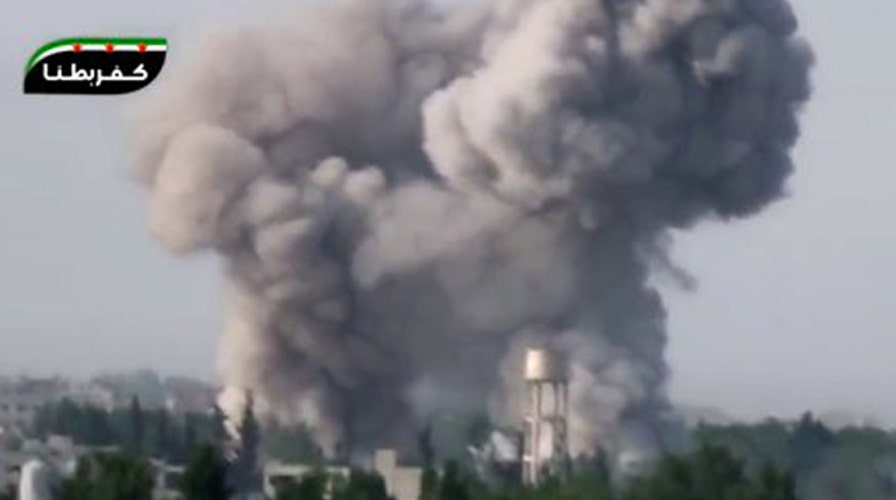Israeli official confirms recent airstrike on Syria
Conor Powell reports from Jerusalem, Israel
Israel launched its second airstrike in three days in the Syrian capital of Damascus, targeting a shipment of extremely accurate Iranian-made guided missiles intended for Lebanon's Hezbollah militant group, according to an intelligence official in the Middle East.
The airstrike on Sunday, which signaled a sharp escalation of Israel's involvement in Syria's bloody civil war, was confirmed to The Associated Press hours after Syria's state media reported that Israeli missiles struck a research center near Damascus, setting off explosions and causing casualties.
"Initial reports point to these explosions being a result of Israeli missiles that targeted the research center in Jamraya," reported SANA, which is Syria's state news agency. Jamraya is about 10 miles from the Lebanese border.
SANA reported the strikes were a response to military gains that President Bashar al-Assad's forces made against rebels, according to a Reuters report.
A Syrian activist group, the Britain-based Syrian Observatory for Human Rights, also reported large explosions in the area of Jamraya.
An amateur video said to be shot early Sunday in the Damascus area showed a huge ball of fire lighting up the night sky. The video appeared genuine and corresponded to other Associated Press reporting.
The official told The Associated Press that, as with Friday's strike, Israel's target was Fateh-110 missiles, which have very precise guidance systems with better aim than anything Hezbollah has in its arsenal. The official spoke on condition of anonymity in order to disclose information about a secret military operation to the media.
The Fateh-110, or Conqueror, is a short-range ballistic missile developed by Iran and first put into service in 2002. The Islamic Republic unveiled an upgraded version in 2012 that improved the weapon's accuracy and increased its range to 185 miles.
Iranian Defense Minister Gen. Ahmad Vahidi said at the time that the solid-fueled missile could strike with pinpoint precision, making it the most accurate weapon of its kind in Iran's arsenal.
Israel has said it will not allow sophisticated weapons to flow from Syria to the Lebanese Hezbollah militia, an ally of Assad and a heavily armed foe of the Jewish state.
Syria condemned the airstrikes, saying the attacks aim "to give direct military support to terrorist groups" fighting the government. The Assad regime often refers to rebel forces as "terrorists."
The Syrian Foreign Ministry also said Sunday in a letter sent to the United Nations and the U.N. Security Council that the "Israeli aggression" killed and wounded several people and "caused widespread destruction."
The U.S. State Department and Pentagon had no immediate comment. The Israeli Embassy in Washington declined a request for comment from Reuters.
Iran's Foreign Ministry spokesman condemned the airstrike but gave no other hints of a possible stronger response from Tehran or its allies.
Ramin Mehmanparast, who spoke to Iran's semiofficial Fars news agency, offered the first comments from Iran since Israel started launching airstrikes on Friday.
Mehmanparast urged countries in the region to remain united against Israel.
A statement Sunday from Egyptian President Mohammed Morsi's office said Egypt "strongly objects" to the bloodshed and the use of Syria's military against its people. But it also rejects the violation of Syrian sovereignty and "exploiting its internal crisis under whatever pretext." It says the Israeli attacks "increase the complexity of the situation."
Hours after the reported airstrike, Israel's military said it had deployed its Iron Dome rocket defense system to the north of the country as part of "ongoing situational assessments."
The Iron Dome protects against short-range rockets. Hezbollah has thousands of such projectiles.
Israel's first airstrike in Syria, in January, also struck Jamraya.
At the time, a U.S. official said Israel targeted trucks next to the research center that carried SA-17 anti-aircraft missiles. The strikes hit both the trucks and the research facility, the official said. The Syrian military didn't confirm a hit on a weapons shipment at the time, saying only that Israeli warplanes bombed the research center.
Israeli lawmaker Shaul Mofaz, a former defense minister and a former chief of staff, declined to confirm the airstrike but said Israel is concerned about weapons falling into the hands of Hezbollah amid the chaos of Syria's civil war.
"We must remember that the Syrian system is falling apart and Iran and Hezbollah are involved up to their necks in Syria helping Bashar Assad," he told Israel Radio. "There are dangers of weapons trickling to the Hezbollah and chemical weapons trickling to irresponsible groups like Al Qaeda."
The Associated Press and Reuters contributed to this report.

